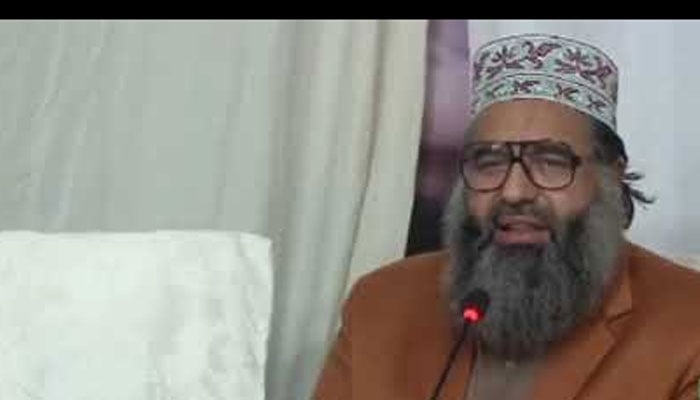JUI-F faces infighting after Qari Usman’s exclusion from new party structure
The Jamiat Ulema-e-Islam-Fazl (JUI-F) completed its restructuring from union committee to central level last week, but differences within the party at Karachi level deepened after the party’s new leadership passed over Qari Muhammad Usman, the main face of the JUI-F in the city, in the provincial structure.
The JUI-F recently issued a list of new office-bearers for Sindh — a 17-member provincial cabinet and a 45-member provincial council — but the name of Usman, who had served as the party’s Karachi president and Sindh deputy chief, was not included in the two organisational bodies, causing a strong reaction among the party workers in the city.
Maulana Abdul Samal Haleejvi and Allama Rashid Soomro have been re-elected chief and general secretary respectively of the JUI-F Sindh chapter. From Karachi, Maulana Abdul Karim Abid has been made provincial deputy chief (fourth) and Aslam Ghauri has been given the responsibility of secretary (first). The party’s former District East chief Maulana Abdul Ghayyas has been made provincial financial secretary.
Before holding intra-party polls in Karachi’s six districts, the JUI-F claimed to have registered over 100,000 party members across the city. But during the party’s organisational polls, differences among two key figures of the party — Usman and Soomro — openly emerged after both leaders fielded their panel for the district restructuring process.
Although intra-party elections in five districts have completed, the party is yet to hold its organisational polls in District West, one of the party’s strongholds.
In District West, Usman was contesting for the post of district head Maulana Umar Sadiq, a former MPA, but because of the seriousness of the situation, the party postponed the polls. Party insiders told The News that differences between Usman and Soomro have now taken an ethnic turn, and it would affect the party in the city, where it is a potent political force.
In the 2002 general elections, when Usman was the JUI-F Karachi president, the party performed well to win significant seats from the city under the banner of the Muttahida Majlis-e-Amal. At that time, the JUI-F won three provincial assembly seats from the city and all its MPAs were Pashtuns.
Later, the party’s provincial leadership abolished the Karachi organisation and adjusted Usman as provincial deputy chief. “Soomro abolished the Karachi organisation because of a personality clash with Usman,” claimed a senior party leader.
In every political party — whether it is the Pakistan Peoples Party or the Jamaat-e-Islami — the Karachi leadership has more acceptance and exposure nationally after their party’s central chiefs. Political analysts and circles within the party said that differences among the party’s ranks and the ignoring of Usman in the party would damage the party in the city.
-
 James Van Der Beek's Friends Helped Fund Ranch Purchase Before His Death At 48
James Van Der Beek's Friends Helped Fund Ranch Purchase Before His Death At 48 -
 King Charles ‘very Much’ Wants Andrew To Testify At US Congress
King Charles ‘very Much’ Wants Andrew To Testify At US Congress -
 Rosie O’Donnell Secretly Returned To US To Test Safety
Rosie O’Donnell Secretly Returned To US To Test Safety -
 Meghan Markle, Prince Harry Spotted On Date Night On Valentine’s Day
Meghan Markle, Prince Harry Spotted On Date Night On Valentine’s Day -
 King Charles Butler Spills Valentine’s Day Dinner Blunders
King Charles Butler Spills Valentine’s Day Dinner Blunders -
 Brooklyn Beckham Hits Back At Gordon Ramsay With Subtle Move Over Remark On His Personal Life
Brooklyn Beckham Hits Back At Gordon Ramsay With Subtle Move Over Remark On His Personal Life -
 Meghan Markle Showcases Princess Lilibet Face On Valentine’s Day
Meghan Markle Showcases Princess Lilibet Face On Valentine’s Day -
 Harry Styles Opens Up About Isolation After One Direction Split
Harry Styles Opens Up About Isolation After One Direction Split -
 Shamed Andrew Was ‘face To Face’ With Epstein Files, Mocked For Lying
Shamed Andrew Was ‘face To Face’ With Epstein Files, Mocked For Lying -
 Kanye West Projected To Explode Music Charts With 'Bully' After He Apologized Over Antisemitism
Kanye West Projected To Explode Music Charts With 'Bully' After He Apologized Over Antisemitism -
 Leighton Meester Reflects On How Valentine’s Day Feels Like Now
Leighton Meester Reflects On How Valentine’s Day Feels Like Now -
 Sarah Ferguson ‘won’t Let Go Without A Fight’ After Royal Exile
Sarah Ferguson ‘won’t Let Go Without A Fight’ After Royal Exile -
 Adam Sandler Makes Brutal Confession: 'I Do Not Love Comedy First'
Adam Sandler Makes Brutal Confession: 'I Do Not Love Comedy First' -
 'Harry Potter' Star Rupert Grint Shares Where He Stands Politically
'Harry Potter' Star Rupert Grint Shares Where He Stands Politically -
 Drama Outside Nancy Guthrie's Home Unfolds Described As 'circus'
Drama Outside Nancy Guthrie's Home Unfolds Described As 'circus' -
 Marco Rubio Sends Message Of Unity To Europe
Marco Rubio Sends Message Of Unity To Europe




